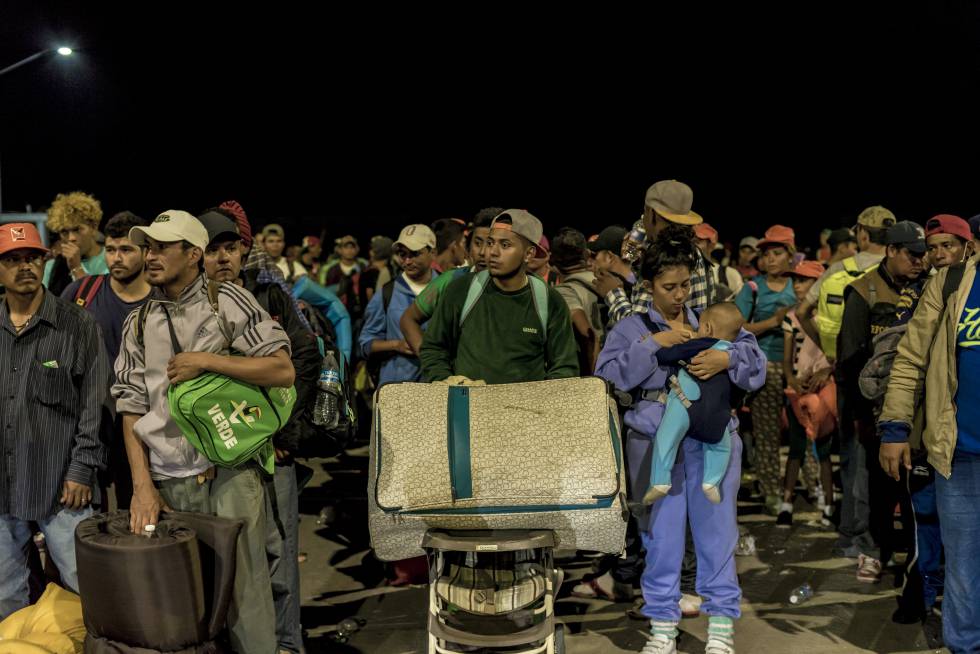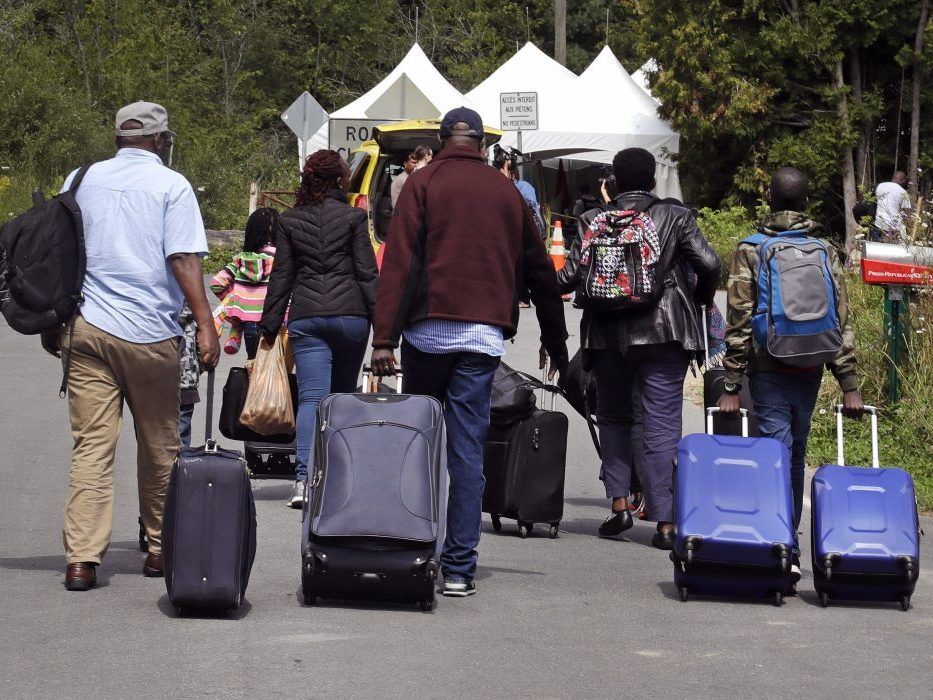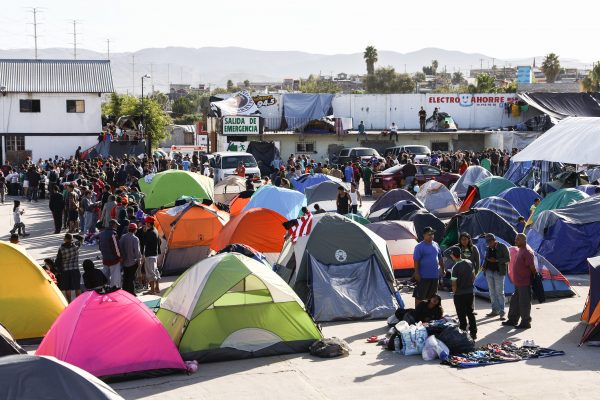The United Nations' Borderless World
"[The migrants were promised a warm welcome upon arriving in Tijuana]. [That] there would be representatives from Canada, there would be even representatives from Switzerland, there would be representatives from many countries. So they painted a colorful world for us, and upon arriving here, we realize it wasn’t like that."
"So from that perspective, I do think we might have been used. There is that chance."
"I didn’t leave my country for political reasons. As I said, the personal issues I had because of my father’s murder, and then the economic issues—that’s what made me leave. [Leaving his wife and two daughters, aged 5 and 8, in San Pedro Sula, one of the most crime-ridden cities in Honduras, and the origin of the caravan.]"
"I have faith in God, that I will be able to enter legally to the United States. That’s my hope, that’s the faith I have. If the answer is negative, I have the option of working here in Mexico."
Honduran Carlos Javier Ramos
| The new migrant camp, 10 miles from the U.S. border, in the Mariano Matamoros neighborhood of Tijuana, Mexico, on Dec. 2, 2018. (Charlotte Cuthbertson/The Epoch Times) |
"Another answer they [Mexican federal government] have given me is that in California, there is the biggest and toughest law firms who have defeated Mr. Trump on the migration issues. But then I ask them, ‘Tijuana is the most guarded border in whole America between Mexico. Why Tijuana?’ I mean what’s the main issue here. Are they trying to strangle us? They’re trying to disrupt our way of living?"
"[It is costing Tijuana $25,000 daily to feed and house the migrants.] This is a national security matter for us Mexicans. We have to solve this matter, this issue, because they’re humans. Either they go across the border, either they stay in Mexico, either they go back home, whatever, but we have to solve it."
Tijuana Mayor Juan Manuel Gastélum
"We have to assume that a specific policy was being supported by such decisions. This policy—which would further the political agenda of the caravan facilitators, with Pueblo Sin Fronteras dominating—is meant to create drawn-out ‘political theater’ to keep the international media spotlight on the issue of immigration rights and their advocacy of open borders, in direct variance to the sovereign rights of states."
"In this case, with all the international media attention, I don’t see it as a cartels/safety issue. Also remember, we have remnants of [the drug cartels] AFO, Sinaloa, and the CJNG (Nueva Generación) in Tijuana. As the different cartel coalitions fight for control of it, the homicide rate is through the roof so that city is not necessarily safe."
Dr. Robert Bunker, instructor, Safe Communities Institute, University of Southern California
 |
 |
Canada has its own problems with illegal border crossers, deliberately ignoring the presence at the border between the United States and Canada of official immigration centres, choosing to cross instead where no such legal entry points are located. Once they've crossed, singly or in a group and are apprehended by the RCMP they declare themselves refugees. Tens of thousands have entered Canada via the U.S. border in the past several years as illegal migrants claiming to be refugees and seeking safe haven.
In so doing, Canada welcomes them as possible refugees, preparing to examine their claim in their refugee application. In the meanwhile Canada, like Mexico, has the humane obligation of providing shelter, medical aid and food for the next two years until such time as their applications are processed through the immense backlog, and they are declared valid refugees, or refused status. In the latter instance they have the right under Canadian law to contest that ruling by appealing to several layers of federal courts, which gives them another several years of Canadian welfare and other social services.
Those who are destined for deportation disappear into the underground frequently, their presence unknown as they remain illegally in Canada. Their numbers are not known, but it is known that in the United States tens of millions of illegals live and work, send their children to school, receive benefits and hope to be allowed to remain. Most represent good solid citizens while some among them are anything but, whether in the U.S. or in Canada. The issue is that there is a legal point of entry and a legal application process and these have both been spurned.
Now the United Nations is in the process of having its member-states sign on to the Global Compact on Migration, to become the first inter-governmental agreement under that august body to cover all areas of international migration, its aim ostensibly to improve cooperation between countries and to be signed next week in Morocco by participating countries. There are 23 objectives and commitments focusing on migration from the time a migrant chooses to leave their country of origin to that time they return. The United States will not sign the agreement, nor will Croatia or Hungary.
 |
Canada will, however, because its Liberal government is one that prides itself on conspicuous virtue and compassion and, as stated by Prime Minister Justin Trudeau: "Welcoming people through a rigorous immigration system from around the world is what has made Canada strong, and indeed something the world needs more of". The interpretation to that is any country that fails to welcome law-breaking intruders posing as refugees has left its humanitarian instincts behind in a selfish bid to control who enters their country and how their entry will be of benefit to the country's goals.
On the surface, there are few who could find fault with the UN's stated purpose in having countries sign on to the agreement; that refugees and migrants are entitled to universal human rights; that countries should improve cooperation on international migration to save lives and keep migrants out of harm's way. But rather than move people en masse out of their home country and into a receiving country whose government guarantees security unlike the home country, why not hold the failed governments to account for their lack of attention to the needs of their citizenry?
The Conservative opposition in Canada makes no bones about opposing the UN agreement with the argument that it would allow foreign entities to have influence over Canada's system of immigration, would influence media coverage of issues relating to immigration and be injurious to Canada's sovereignty: "Canadians and Canadians alone should make decisions on who comes into our country and under what circumstances. Instead of signing international agreements that erode our sovereign right to manage our borders, the prime minister should focus on restoring order at home", stated Conservative leader Andrew Scheer.
And there is an immense need for order to be restored within Canada, with the current government's failure to attend to the nation's employment and trade needs, leaving tens of thousands of Canadians unemployed and on the move. The influx of 'refugees' has seen Montreal and Toronto placing these migrants in shelters meant for Canadians whom a downturn in fortune has left adrift in poverty, requiring welfare and shelter. Now, 40 percent of the welfare infrastructure is taken up with migrant placement, costing those municipalities and provinces millions that will add up to much, much more in the near future.
The Canadian public is not enamoured of the situation; open to receiving immigrants who respect Canada sufficiently to obey its laws and their obligations to it, but unwilling to agree to what has become an open border for migrants to stream into Canada demanding their 'human rights'. And for their opinions, being labelled by the government racists and haters, effectively shutting down freedom to discuss the issue. Now, once the international agreement is signed Objective 17 obligates countries to "promote independent, objective and quality reporting of media outlets, including Internet-based information, including by sensitizing and educating media professionals on migrant-related issues and terminology".
In other words it will become illegal for media of any kind to discuss and conceivably criticize the kind of open borders and accommodation to migration that the UN wishes to enforce on all its member-nations. Ironically the agreement goes on to say that signatories will be committed to protecting free speech, "recognizing that an open and free debate contributes to a comprehensive understanding of all aspects of migration" -- as long as it reflects the UN's unquestioned point of view.
It is a global expansion of the European Union's forcing of its member states to agree to receiving apportioned numbers of 'refugees' that have streamed into Europe from the Middle East and Africa in the past years, where Germany alone has absorbed a million such 'refugees', aka economic migrants and where chaos has resulted as German culture, heritage and laws come abreast of tribal, sectarian, Islamic sharia and demands for special recognition and accommodation.
Labels: Canada, Illegal Migrants, Migrants, Refugees, United Nations, United States

0 Comments:
Post a Comment
<< Home